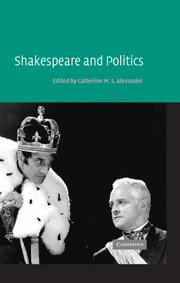Book contents
- Frontmatter
- Contents
- List of contributors
- Editor's note
- 1 Shakespeare and politics: an introduction
- 2 Shakespeare and politics
- 3 Henry VIII and the deconstruction of history
- 4 Livy, Machiavelli, and Shakespeare's Coriolanus
- 5 Richard II and the realities of power
- 6 Plutarch, insurrection, and dearth in Coriolanus
- 7 Some versions of coup d'état, rebellion, and revolution
- 8 Language, politics, and poverty in Shakespearian drama
- 9 ‘Demystifying the mystery of state’: King Lear and the world upside down
- 10 Venetian culture and the politics of Othello
- 11 The Bard and Ireland: Shakespeare's Protestantism as politics in disguise
- 12 Henry V as working-house of ideology
- 13 ‘Fashion it thus’: Julius Caesar and the politics of theatrical representation
- 14 Take me to your Leda
- 15 Macbeth on film: politics
- 16 William Shakespeare's Romeo + Juliet: everything's nice in America?
- Index
3 - Henry VIII and the deconstruction of history
Published online by Cambridge University Press: 05 June 2012
- Frontmatter
- Contents
- List of contributors
- Editor's note
- 1 Shakespeare and politics: an introduction
- 2 Shakespeare and politics
- 3 Henry VIII and the deconstruction of history
- 4 Livy, Machiavelli, and Shakespeare's Coriolanus
- 5 Richard II and the realities of power
- 6 Plutarch, insurrection, and dearth in Coriolanus
- 7 Some versions of coup d'état, rebellion, and revolution
- 8 Language, politics, and poverty in Shakespearian drama
- 9 ‘Demystifying the mystery of state’: King Lear and the world upside down
- 10 Venetian culture and the politics of Othello
- 11 The Bard and Ireland: Shakespeare's Protestantism as politics in disguise
- 12 Henry V as working-house of ideology
- 13 ‘Fashion it thus’: Julius Caesar and the politics of theatrical representation
- 14 Take me to your Leda
- 15 Macbeth on film: politics
- 16 William Shakespeare's Romeo + Juliet: everything's nice in America?
- Index
Summary
Two preliminary problems impose themselves at the outset of any study of Henry VIII. In both cases, the issues raised may in a narrow sense be dispatched rather quickly, though their wider ramifications continue to bear on our reading of the play.
The first problem, of course, is that of authorship, which has bedevilled criticism ever since Spedding, in 1850, attempted to substantiate Tennyson's intuition that the play was written by Shakespeare in collaboration with Fletcher. The burden of proof that necessarily rests with those who would follow Spedding is augmented by the fact that this hypothesis is unsupported by any external evidence. Indeed, since the surviving ballad concerning the burning of the Globe theatre in 1613 records that Heminges and Condell were both present at the fateful performance of Henry VIII, their inclusion of the play in the First Folio ten years later must have taken place with full knowledge of the circumstances of its composition and hence provides a measure of tangible evidence that it is not a collaboration. Strikingly, both Pericles and The Two Noble Kinsmen, the two other plays in the Shakespearian canon most often thought to have been written by more than one hand (the latter on the incontrovertible basis of the title page of the 1634 quarto and an 8 April 1634 entry in the Stationers' Register, both of which ascribe the play to Shakespeare and Fletcher), do not appear in the Folio, whereas the Hecate scenes in Macbeth, which might be cited as a counterexample, are a case of circumscribed interpolations rather than of an entire play written by Shakespeare jointly with a second playwright.
- Type
- Chapter
- Information
- Shakespeare and Politics , pp. 44 - 66Publisher: Cambridge University PressPrint publication year: 2004

